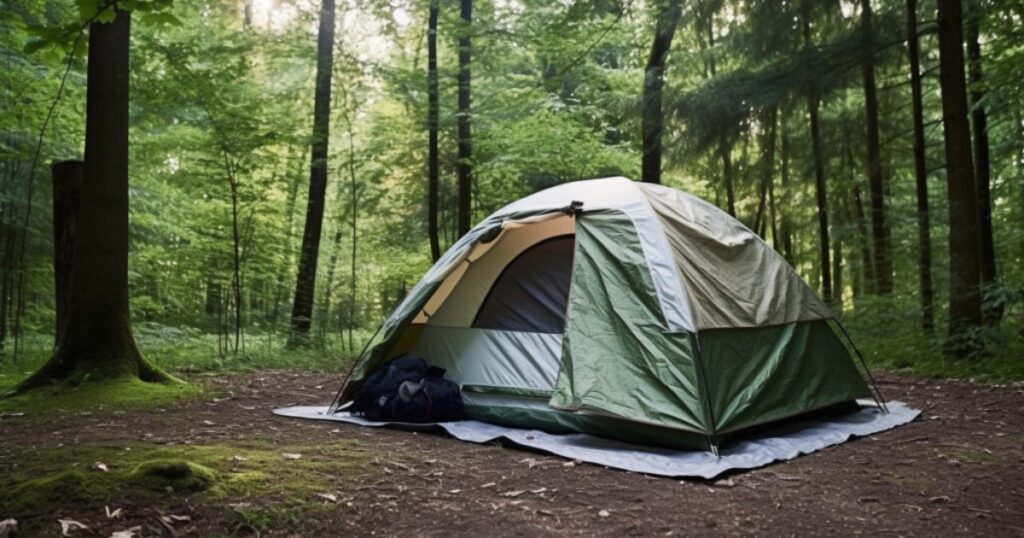Introduction
If you’re looking for a peaceful camping experience, soundproofing your tent is key. Imagine trying to enjoy the crackling campfire, only to be constantly disturbed by noisy neighbors or the loud sounds of the campground. No matter what kind of event you’re at, whether it’s a wedding or a simple trip, unwanted sounds can easily ruin the atmosphere. I know from personal experience that the best way to create a quiet sanctuary inside your tent is by starting with a few effective steps.
Soundproofing a Tent for Peaceful Escape
Getting into nature is always a great way to relax and destress, but the peaceful experience can be ruined by unexpected noise. Whether it’s nearby campers, the hum of roads, or the distant sound of wildlife, these disruptions can make it hard to enjoy your time outdoors. Soundproofing your tent can help you create a more serene environment, blocking out all the unwanted sounds. Although it might seem tricky since tents aren’t made of sturdy materials like brick walls, it’s possible to make your camping experience a lot quieter.
Challenges of Soundproofing a Tent
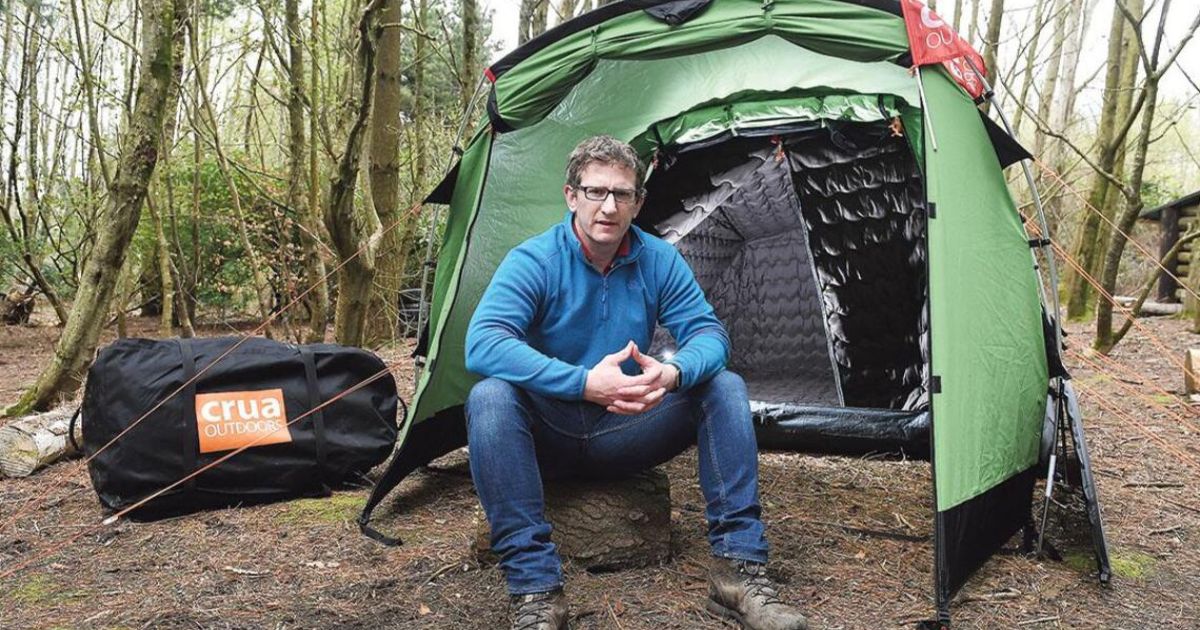 When you think about a secure, thick-walled room, it’s easy to picture how noise can be blocked effectively. In contrast, tents are often thin, light, and lack the solid construction of a typical building. This makes it more challenging to soundproof them completely. But even though it’s difficult, there are strategies you can use to reduce the ambient noise pollution. Remember, the goal isn’t perfect silence, but just enough to create a more peaceful environment where you can sleep or relax without constant distractions.
When you think about a secure, thick-walled room, it’s easy to picture how noise can be blocked effectively. In contrast, tents are often thin, light, and lack the solid construction of a typical building. This makes it more challenging to soundproof them completely. But even though it’s difficult, there are strategies you can use to reduce the ambient noise pollution. Remember, the goal isn’t perfect silence, but just enough to create a more peaceful environment where you can sleep or relax without constant distractions.
Techniques to Soundproof Your Tent
If you’ve decided to learn how to soundproof your tent, there are a few simple actions you can take. One of the first things you’ll want to do is address the problem of sound leakages. Start by using a thick material like blankets or mats on the walls of your tent to absorb some of the sound. Adding extra layers will block out more noise from the outside. Some even use foam or insulating materials around the tent’s seams to minimize the sound that slips through.
Choosing the Right Location and Tools
When you’re camping, noise often comes from the environment around you, such as the weather, railroads, or even your fellow campers. So, picking the right spot for your tent is crucial. Find a serene area that is naturally shielded from loud disturbances. Once you’ve set up your tent in the best location, consider using soundproofing tools like earplugs, white noise machines, or even portable walls that can help further limit the outside noise. These simple additions can make a huge difference in creating a more peaceful, relaxing camping experience.
Strategies for Better Sleep While Camping
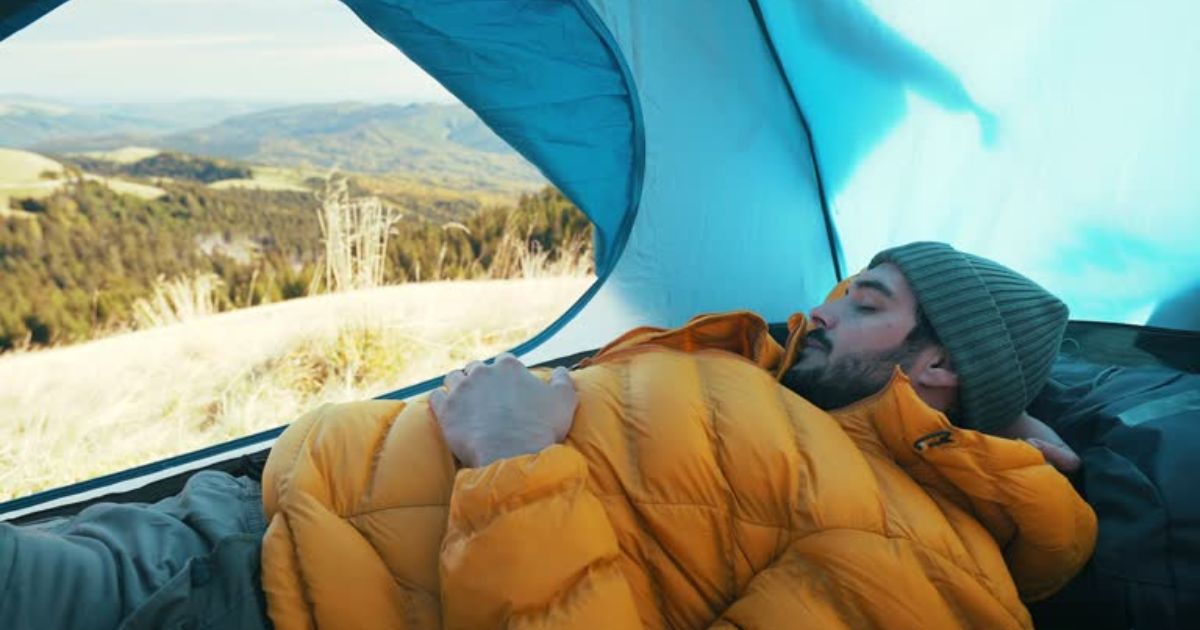 If you’re someone who struggles to sleep when camping due to noisy surroundings, consider using techniques that help you sleep through the disruptions. A combination of relaxation techniques and the right soundproofing methods can significantly improve your sleep quality. When sleep is constantly interrupted by outside noises, it can leave you feeling more exhausted than refreshed. Try using earplugs or sleep masks to block out light and sound, and you’ll wake up feeling more recharged instead of groggy.
If you’re someone who struggles to sleep when camping due to noisy surroundings, consider using techniques that help you sleep through the disruptions. A combination of relaxation techniques and the right soundproofing methods can significantly improve your sleep quality. When sleep is constantly interrupted by outside noises, it can leave you feeling more exhausted than refreshed. Try using earplugs or sleep masks to block out light and sound, and you’ll wake up feeling more recharged instead of groggy.
Camping should be a peaceful retreat from the daily grind, but noise often ruins the experience. If you’ve ever been woken up by a nearby camper’s loud conversations or the constant sounds of nature, you’ll know how essential it is to soundproof your tent. Fortunately, there are practical ways to achieve a calming retreat without breaking the bank.
Simple Soundproofing Solutions for Your Tent
A well-insulated tent can dramatically improve your camping experience. One of the easiest ways to reduce external noise intrusion is by adding some form of soundproofing. It doesn’t need to be expensive; you can start with simple tools or techniques. For instance, carpeting the floor helps muffle noise from people or music. The thicker the carpet, the better it absorbs sound, especially if it’s a shag carpet. I’ve found that laying down multiple layers of carpet significantly helps in keeping the sound from traveling through the ground.
Even if you don’t have access to a thick carpet, don’t worry. Layering thinner rugs can also make a difference. The more you cushion the surface, the better. It’s not just about blocking the noise—it’s about managing the sound buildup inside your tent. By focusing on these basic soundproofing steps, you can create a more peaceful environment with minimal effort.
Effective Ways to Block Noise with Curtains
If your tent is large enough, you can take your soundproofing to the next level with soundproof curtains. These heavy curtains are ideal for blocking out noise. I’ve personally hung them over the entrance of my tent to block the sounds from outside. The thicker the curtain, the better the results. I recommend velvet curtains because they’re dense and have multiple layers that can absorb sound effectively.
These curtains don’t only work for keeping the noise down—they also add a layer of acoustic privacy. Whether you’re inside your tent talking, laughing, or just unwinding, you don’t have to worry about disturbing the campers around you. Plus, they’re a practical alternative to an expensive acoustic barrier.
Why Acoustic Isolation Matters
When you’re camping, you want to fall asleep without distractions. Acoustic isolation is the key to achieving this. By using the right materials and techniques, you can reduce the sounds from outside that might keep you awake. In my experience, a combination of soundproofing and tent insulation works wonders. It helps regulate the temperature, making your tent feel cooler in the summer and warmer in the colder months. This makes it easier to sleep, ensuring you wake up feeling focused and energetic.
Creating Your Own Little Sanctuary

The goal of soundproofing your tent is to create a sanctuary that shields you from the outside world. When done correctly, your tent becomes a peaceful haven where you can fully relax and enjoy the camping experience. The combination of carpeting, soundproof curtains, and insulation barriers allows you to block out both external noise and internal sound buildup. This gives you a more comfortable and calming retreat, which is essential for a good night’s sleep.
Make the Most of Simple Solutions
For those on a budget or just looking for quick fixes, simpler solutions can still provide significant results. Even just blocking the entrance with a heavy fabric or adding a few layers of carpet can reduce a lot of unwanted sound. I’ve personally found that focusing on a few basic techniques can lead to a noticeable difference in how peaceful the environment feels inside the tent.
There’s no need to invest in complex or expensive soundproofing equipment. Often, the right combination of thick carpets and soundproof curtains will do the trick. By layering these solutions, you can absorb sound effectively, creating a more serene atmosphere for yourself and your camping companions.
Effective Ways to Soundproof Your Tent
When you’re out camping, finding peace and quiet can be a challenge. While it’s lovely to hear birds chirping and the gentle sound of trees rustling, disruptive chatter and outside noises can quickly ruin your experience. To create a peaceful atmosphere inside your tent, it’s crucial to block unwanted sounds and create a more serene environment. One great way to do this is by using heavy drapes or acoustic blankets. Hanging many layers of these sound absorbing blankets on your tent’s walls and ceiling can significantly help reduce noise. Even though it won’t block out everything, it will still make a big difference.
Installing Acoustic Foam Panels
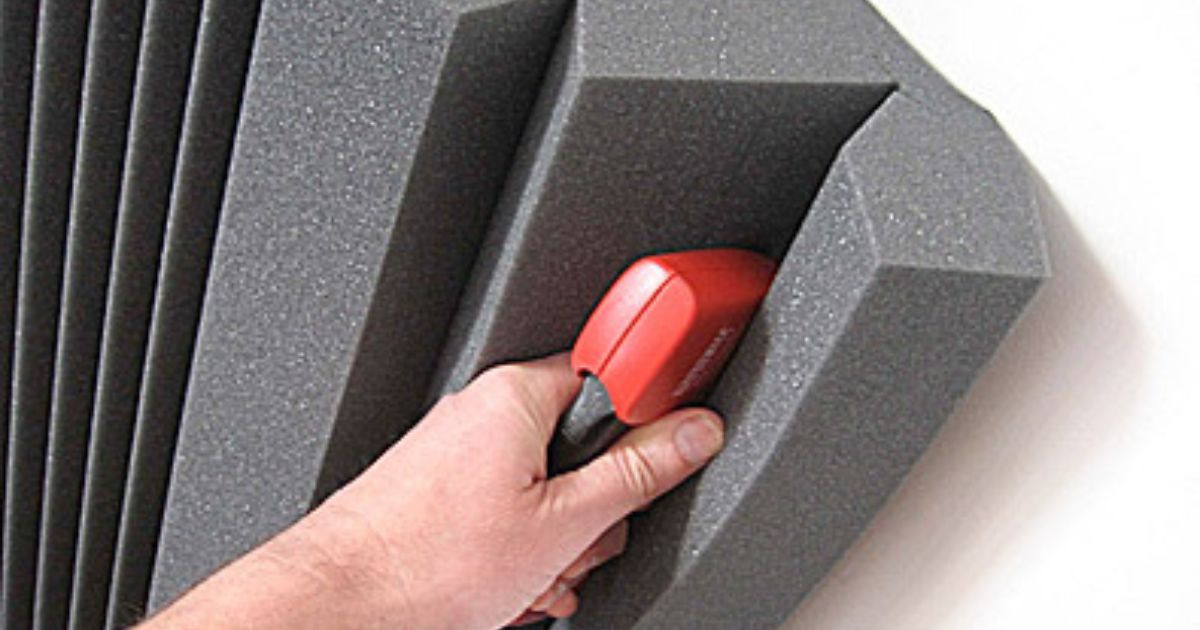 For an even more effective solution, consider installing internal acoustic foam panels. These panels, often used in recording studios and sound rooms, can absorb a lot of the surrounding noise, especially if you’re near busy areas. These foam panels help mitigate noise pollution by obstructing the direct path of sound waves. Though this method might seem more complex, it can be a game-changer if you want to take your soundproofing to the next level. Larger tents make it easier to set up, but even in smaller tents, you can still benefit from adding a layer of dense material like MLV to reduce external disturbances.
For an even more effective solution, consider installing internal acoustic foam panels. These panels, often used in recording studios and sound rooms, can absorb a lot of the surrounding noise, especially if you’re near busy areas. These foam panels help mitigate noise pollution by obstructing the direct path of sound waves. Though this method might seem more complex, it can be a game-changer if you want to take your soundproofing to the next level. Larger tents make it easier to set up, but even in smaller tents, you can still benefit from adding a layer of dense material like MLV to reduce external disturbances.
Layering for Extra Noise Reduction
Another clever trick is to cover the ground with carpets. It may seem simple, but carpeting the floor actually helps reduce bass frequencies that often travel through the ground. I found that laying down multiple layers of carpet helps to muffle the noise from people walking around or music playing nearby. Just like an acoustic barrier, the more layers you add, the more effective it becomes at cutting down unwanted sound, allowing you to sleep soundly even when the campsite gets busy.
Practical Tips for Tent Soundproofing
To truly block out noise, you should also consider using acoustic barriers made from fiberglass quilts or other soundproofing materials. These barriers are designed to absorb and deflect sounds, so adding them to your tent will help create an extra layer of protection against external noises. If you’re staying in a larger tent, this becomes even easier to manage. Even though they’re not as effective as true acoustic barriers used in construction, the materials are still good enough to create a quieter space inside your tent.
Combining Different Techniques
Finally, to get the best results, it’s important to combine various techniques. Adding heavy drapes, installing acoustic foam panels, covering the ground with carpets, and using temporary barriers made from soundproof materials all work together to create a serene, noise-free environment. By layering these methods, you’ll significantly reduce the amount of external sound making its way into your tent, allowing you to enjoy a more peaceful camping experience.
Soundproofing a tent isn’t as complicated as it may seem. If you’re looking to enjoy a peaceful night without the interruption of outside noise, there are several strategies you can implement to create a quiet, serene space. Whether you’re camping in a busy area or just need a calm retreat, here’s how to make your tent feel like a peaceful cocoon.
Using Thick, Heavy Blankets for Effective Soundproofing
One of the best ways to soundproof a tent is by using thick, heavyweight blankets or quilts. Opt for those with multiple layers of dense fabric and insulation. Moving blankets, voice recording blankets, and even comforters work well for this purpose. They are excellent at absorbing sound, preventing it from entering your tent.
Avoid using thin or porous fabrics, as they don’t provide the necessary insulation. A good trick is to drape these blankets over the walls and the ceiling of your tent. For added security, you can use binder clips, tape, or weights to ensure a tight seal. This not only blocks out sound but also helps keep heat inside during colder nights.
Layering for Maximum Noise Reduction
If you’re unable to find a thick carpet or blanket, don’t worry. You can still achieve significant noise reduction by layering multiple thinner rugs or blankets. The more layers you add, the better your tent will be at absorbing sound. A thick shag carpet, for instance, works wonders when used to cover the floor. The padding it provides will help cushion any sound that may otherwise travel through the tent.
Remember, the more coverage you can get with your blankets, the more outside noise will be absorbed. So, make sure to cover all surfaces, from the walls to the floor. This extra layer helps to prevent noise from reaching your interior space, allowing for a more peaceful experience.
Installing Acoustic Barriers and Curtains
For those looking for a more high-tech solution, acoustic barriers can be a game-changer. These are usually made of thick materials designed to block sound waves from passing through. You can easily hang them using clips or durable rope along your tent’s walls. This will help absorb or deflect sound from external sources like nearby campsites or traffic.
Alternatively, noise-reducing curtains offer a great way to keep your tent quieter. Simply drape them across the tent’s walls or ceiling. Not only do they help block noise, but they also provide the added benefit of keeping sunlight out in the mornings, allowing you to sleep in a bit longer.
Utilizing Destructive Interference
If your tent happens to have a sound system, destructive interference can be a great way to manage sound. This technique works by placing noise in the path of sound waves, which helps to cancel out unwanted noise. This is particularly effective for bass sounds, which tend to travel much farther. If your speakers are pointed at each other, facing a dance floor or audience, the frequencies from your speakers may disrupt one another, lessening the overall noise output.
Soundproof Walls for Open-Sided Tents
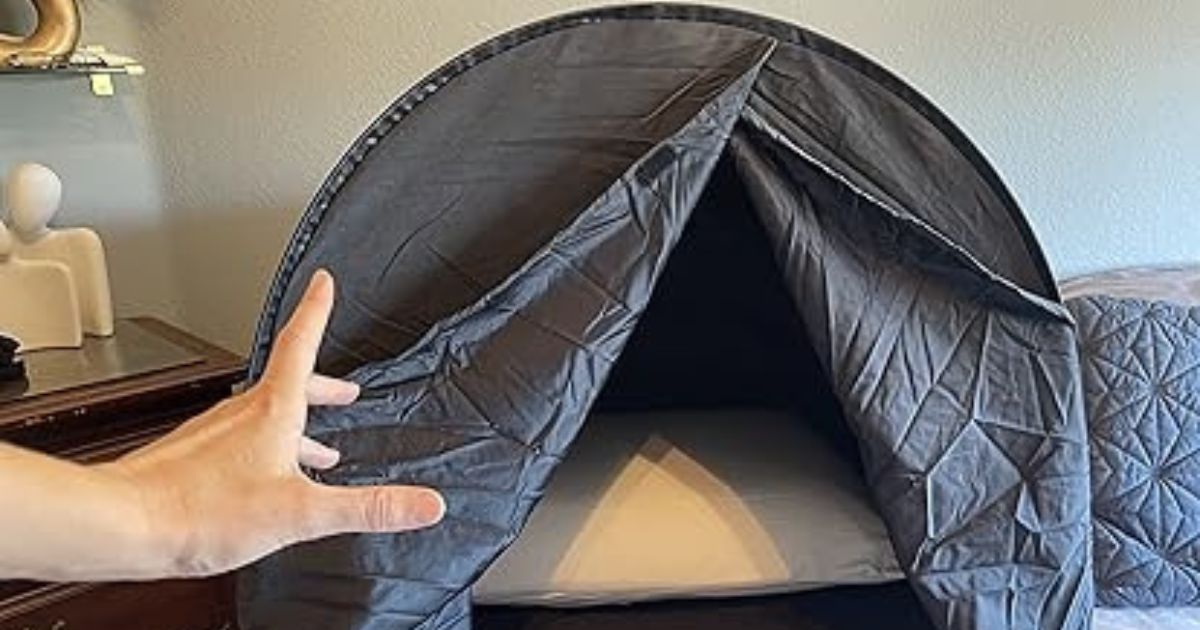 For tents with entrances or open sides, creating a solid soundproof wall can help a lot. These walls can help muffle noise coming from outside, especially in residential areas where you may be concerned about potential noise complaints. In addition to reducing the noise from outside, a well-constructed soundproof barrier helps contain any noise produced by people inside your tent. This creates a more controlled environment, perfect for gatherings or quiet moments of relaxation.
For tents with entrances or open sides, creating a solid soundproof wall can help a lot. These walls can help muffle noise coming from outside, especially in residential areas where you may be concerned about potential noise complaints. In addition to reducing the noise from outside, a well-constructed soundproof barrier helps contain any noise produced by people inside your tent. This creates a more controlled environment, perfect for gatherings or quiet moments of relaxation.
Seal Gaps and Use Acoustic Sealant Tape for Complete Isolation
When setting up your tent, it’s essential to address every small gap and hole that could let sound through. Even the tiniest gaps or any lifting at the blanket edges can compromise your acoustic isolation. This means that sound can seep in through these weak spots, disrupting your peaceful camping experience. To truly minimize this, start by meticulously sealing the gaps using acoustic sealant tape. This special tape, often aluminum-coated, is designed to block air gaps and help create a tighter, airtight acoustic seal. The key here is using the right materials; acrylic sealant works much better than rubber because it doesn’t deteriorate as quickly over time.
Apply this tape to all seams between the tent panels, ensuring complete coverage where blankets meet the fabric. It’s also crucial to cover zippers, vents, and any other openings, such as ports and stove jackets, with this tape or hook/loop patches. This not only improves soundproofing but also prevents unwanted noise from disturbing your sleep. It’s worth noting that you should avoid permanent adhesives since they can leave sticky residue if removed later, which can be a hassle.
Utilize Noise-Blocking Tools: Blankets, Headphones, and Earplugs
Adding a layer of blankets inside your tent is an easy yet effective way to soundproof the interior. Heavy, acoustic blankets are particularly useful for absorbing sound, as they can cover the walls and ceiling of your tent. I’ve found that securing these blankets with binder clips around the edges helps ensure they stay in place, blocking noise from reaching you. But even the best blankets won’t be enough without proper sealing around the edges. Be sure to apply acoustic tape around the blanket edges where they meet the tent fabric.
If you’re still hearing noise despite your efforts, consider the powerful duo of noise-canceling headphones and earplugs. I’ve personally used these, and they work wonders for blocking out external sounds when you’re inside the tent. Whether you’re trying to sleep or simply want some quiet time, a good pair of noise-canceling headphones or disposable foam earplugs can significantly reduce unwanted noise and help create that perfect, peaceful environment.
Prevent Sound Leakage Around the Tent’s Perimeter
One common mistake is neglecting the perimeter of the tent where the blankets meet the floor. To prevent sound leakage, it’s crucial to run acoustic tape along the edges. I recommend using pockets filled with rocks or sand bags to weigh down the blanket edges, ensuring they stay in place and prevent any gaps. This will help eliminate air exchange and reinforce your tent’s soundproofing abilities.
Maintaining Your Tent’s Soundproofing Over Time
Even after sealing and adding soundproofing materials, you should inspect your tent annually to ensure there are no new gaps or weaknesses. Over time, some of the adhesive used may become loose, so it’s essential to re-tape areas where noise may be leaking through. Regular checks will ensure that your tent stays in top shape for blocking out external sounds, allowing you to maintain a completely airtight acoustic seal.
Conclusion
soundproofing your tent is essential for creating a peaceful and relaxing camping experience. By using simple yet effective techniques such as adding acoustic blankets, sealing gaps with acoustic sealant tape, and incorporating noise-canceling headphones or earplugs, you can significantly reduce unwanted noises from the outside. Additionally, layering thick carpets or using soundproof curtains can enhance the overall effectiveness of your soundproofing efforts. Taking the time to properly set up your tent with these tools and methods will help you enjoy a serene environment, ensuring a restful sleep under the stars, free from distractions.
FAQs: How to Soundproof a Tent for Peaceful Camping
1. How can I seal small gaps in my tent for better soundproofing?
To effectively seal small gaps in your tent, you should use acoustic sealant tape. This tape, especially when aluminum-coated, is perfect for blocking air gaps and ensuring there are no weak spots that can allow sound to pass through. Be sure to cover seams and edges of the blankets and around zippers, vents, and ports to achieve the best results.
2. Can acoustic blankets really block sound inside a tent?
Yes! Acoustic blankets are very effective for reducing noise within the tent. By covering the walls and ceiling with heavy blankets, you can absorb and deflect sound waves, minimizing noise from the outside. Just make sure the blanket edges are properly sealed with acoustic tape to prevent sound from sneaking through any openings.
3. Are there any specific products I should use for sealing my tent?
Yes, using acoustic sealant tape is highly recommended for sealing seams, zippers, and vents. Look for aluminum-coated cloth tape designed for sealing air gaps in buildings or HVAC systems. Additionally, use pockets filled with rocks or sand bags to weigh down blanket edges for added soundproofing.
4. Will using noise-canceling headphones and earplugs help if my tent isn’t completely soundproofed?
Absolutely! If your tent isn’t fully soundproofed, noise-canceling headphones and earplugs are excellent tools to block out unwanted noise. Earplugs are budget-friendly and easy to use, while noise-canceling headphones provide even more advanced noise reduction for a peaceful camping experience.
5. How often should I check the soundproofing in my tent?
You should inspect your tent at least once a year for any new gaps or signs of wear. Over time, some of the adhesive or tape used to seal the tent may loosen, so it’s essential to re-tape any areas where sound leakage might occur. Regular maintenance ensures your tent remains airtight and keeps outside noise at bay.
